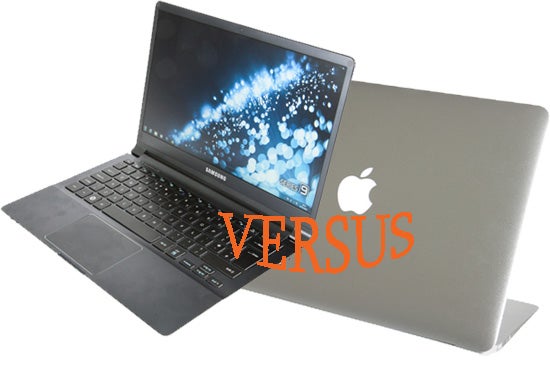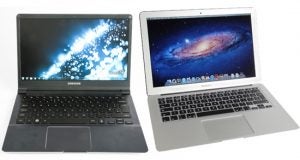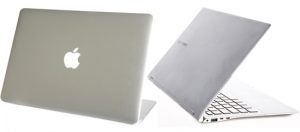MacBook Air VS Samsung Series 9

MacBook Air VS Samsung Series 9: Screen
There’s no denying that the MacBook Air 13in’s screen is a cut above that of most ultraportables. Its colours, contrast and viewing angles are all better than on the average TN-based screen, and its 1,440 x 900 resolution is higher than the 1,366 x 768 pixels found on most 13.3in laptops.
However, the Air’s screen is still TN, and its viewing angles do suffer for it, while the semi-glossy screen finish still suffers the occasional reflection. Samsung’s 13in contender, on the other hand, uses a PLS panel. PLS is an equivalent of IPS, as found on the iPad, Asus Transformer Pad 300, and many professional or high-end monitors. This means its viewing angles are as close to flawless as laptops get. Its fully matt finish eliminates nearly all reflections, and both its 1,600 x 900 resolution and maximum brightness are higher too.
Verdict: The screen on the MacBook Air is good, but that of the Samsung Series 9 is just plain better in every way.

MacBook Air VS Samsung Series 9: Specifications
With Ivy Bridge already available, Intel’s Sandy Bridge CPUs and its integrated HD 3000 graphics are no longer cutting edge, but for everything but 3D gaming, they’re still good enough.
The Air sports a dual-core 1.7GHz Core i5-2557M CPU with a maximum Turbo-clock of 2.7GHz. Samsung’s contender goes for a slightly slower i5-2467M with a 1.6GHz standard speed and 2.3GHz max. You won’t notice the difference in everyday use but with complex tasks like video encoding the MacBook might gain a few seconds advantage. In the case of both their processors are backed by 4GB of DDR3 RAM, HD 3000 graphics and Flash storage, but Apple lets you pick an SSD of up to 256GB while the Samsung Series 9 900X3B tops out at 128GB.
Verdict: You won’t notice the difference in general use, but the Air’s processor is ever so slightly faster, and it offers double the storage capacity if you can afford the upgrade. Therefore it comes out on top here.
MacBook Air VS Samsung Series 9: Battery Life
As with most ultraportables and nearly all Ultrabooks, the batteries of the Series 9 and MacBook Air are not user replaceable, so you have to live with what you get. In our standard battery test, the Air managed five hours and 43minutes, while the Series 9 lasted one minute longer.
Verdict: With battery results that are a minute apart, this is the clearest draw of the lot. It’s also the one area where Apple and Samsung’s premium ultraportables lag behind some of the competition.
MacBook Air VS Samsung Series 9: Value
The cheapest Macbook Air 13in configuration is £1,099, where the Samsung Series 9 900X3B can currently be found for under £1,050.
Verdict: Even without factoring in the cost of an Ethernet adapter which Samsung includes by default, or the current Cash-Back offer which brings its price down to £875, the Series 9 is cheaper. 
MacBook Air VS Samsung Series 9: Final Verdict
Both of these laptops are the most premium ultraportables from their respective manufacturers. They’re beautifully designed and engineered, and build quality is superb. OS differences aside they offer similar user experiences, with comfortable backlit keyboards and superb button-less touchpads. Meanwhile performance and battery life are very similar as well.
However, overall the Series 9 900X3B effortlessly wins out. It’s both lighter and thinner, its connectivity is more flexible and currently more useful, and its higher-resolution screen is simply better in every way. To top it all off, it’s slightly cheaper too.

